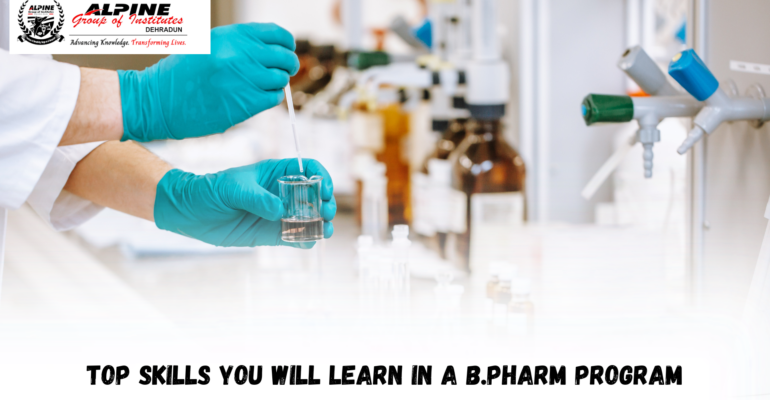Top Skills You Will Learn In A B.Pharm Program
2024-12-28 7:14Top Skills You Will Learn In A B.Pharm Program
A Bachelor of Pharmacy (B.Pharm) degree is a comprehensive and versatile program that equips students with the knowledge and skills required to succeed in the pharmaceutical industry, healthcare settings, and research. Throughout the program, students not only gain a solid foundation in pharmaceutical sciences but also develop a range of technical, analytical, and soft skills that are critical in their professional careers. Below are the top skills you will learn in a B.Pharm program:
1. Pharmaceutical Knowledge & Drug Science
One of the most fundamental skills you acquire in a B.Pharm program is a deep understanding of pharmaceutical science, including:
- Drug Composition: Knowledge of chemical compositions, chemical reactions, and the pharmacological properties of various drugs.
- Drug Formulation: Understanding how different drugs are formulated, including tablets, capsules, syrups, creams, and more.
- Pharmacokinetics: Learning how the body absorbs, distributes, metabolizes, and excretes drugs (ADME process).
- Pharmacodynamics: Understanding how drugs interact with the body to produce therapeutic effects and potential side effects.
This knowledge forms the foundation of a pharmacist’s ability to recommend and administer medications accurately.
2. Analytical and Critical Thinking Skills
In a B.Pharm program, you’ll be trained to think critically and analytically when assessing pharmaceutical data and patient needs. This includes:
- Problem-Solving: The ability to analyze complex medication-related problems and come up with solutions, such as determining the right drug dosage for a patient.
- Research and Data Interpretation: Evaluating clinical studies, research data, and lab results to assess drug effectiveness and safety.
- Decision-Making: Developing the ability to make informed decisions based on patient conditions, side effects, and medication interactions.
This skill set helps in the precise formulation and safe administration of medications.
3. Laboratory Skills
Hands-on learning is an essential part of the B.Pharm program, especially when it comes to pharmaceutical lab work. Key skills include:
- Lab Techniques: Mastery of laboratory techniques such as titration, chromatography, spectroscopy, and dissolving tests to ensure the quality and purity of pharmaceutical products.
- Pharmaceutical Manufacturing: Learning about the production process of pharmaceuticals, including how to manufacture drugs while maintaining quality standards.
- Testing and Analysis: Conducting various quality control tests on drugs, checking their potency, stability, and safety.
These skills ensure that students can work confidently in pharmaceutical labs or quality control departments in manufacturing settings.
4. Communication Skills
Pharmacists are an integral part of healthcare teams and often serve as the primary point of contact between patients and their medications. As a result, strong communication skills are essential. This includes:
- Patient Counseling: The ability to communicate effectively with patients regarding how to take their medications, potential side effects, and proper storage.
- Collaborating with Healthcare Professionals: Pharmacists work closely with doctors, nurses, and other healthcare professionals to provide holistic care for patients.
- Written Communication: Drafting clear and concise prescriptions, reports, and patient education materials.
Effective communication is vital for ensuring patient safety and optimal therapeutic outcomes.
5. Attention to Detail
A successful career in pharmacy requires precision and accuracy. Whether you are dispensing medications or conducting drug research, attention to detail is critical. You will develop the ability to:
- Measure Dosages Accurately: Ensure that prescriptions are filled correctly, preventing errors that could lead to harmful outcomes.
- Assess Medication Labels: Check the authenticity and integrity of drug labels and prescriptions, ensuring the correct medicine reaches the patient.
- Detect Errors: Identify any discrepancies in drug interactions or patient information to prevent potential medication errors.
This skill reduces the risk of dangerous mistakes and ensures patient safety.
6. Time Management and Organizational Skills
Pharmacists often work in fast-paced environments, whether in hospitals, clinics, or pharmacies. In a B.Pharm program, you will learn how to manage time efficiently and stay organized by:
- Managing Multiple Tasks: Balancing lab work, assignments, research, and internships while meeting deadlines.
- Prioritizing Patient Needs: Understanding which tasks or prescriptions require immediate attention and which can be delayed.
- Pharmacy Management: Learning how to manage pharmacy inventory, ensure timely drug delivery, and organize prescription records.
These organizational skills are key to working efficiently in both clinical and commercial settings.
7. Ethical and Legal Awareness
Pharmacists work in environments governed by strict regulations, and understanding the ethical and legal aspects of the profession is a crucial skill you will develop in your B.Pharm program. This includes:
- Understanding Pharmaceutical Laws: Familiarity with laws governing the sale, distribution, and regulation of drugs (e.g., the Narcotic Drugs and Psychotropic Substances Act).
- Ethical Decision Making: Navigating the ethical considerations involved in dispensing medications, maintaining patient confidentiality, and providing unbiased care.
- Regulatory Compliance: Ensuring that drugs and practices comply with industry standards and regulatory bodies such as the FDA or local health authorities.
This knowledge helps ensure safe, legal, and ethical practices in the pharmacy profession.
8. Research and Development Skills
If you’re interested in pharmaceutical innovation or clinical trials, a B.Pharm program provides you with research skills. These include:
- Clinical Research: Conducting studies to determine the safety and efficacy of new drugs, analyzing clinical data, and reporting findings.
- Formulation Development: Researching and developing new drug formulations to improve patient compliance, drug delivery, and therapeutic outcomes.
- Pharmacovigilance: Monitoring, evaluating, and reporting adverse drug reactions, ensuring drug safety post-market.
Research skills are essential for those pursuing careers in pharmaceutical R&D or regulatory agencies.
9. Business and Management Skills
Pharmacy is not just about science; it’s also about managing pharmacy operations. In a B.Pharm program, you’ll also learn key business management skills, including:
- Pharmacy Operations: Understanding how pharmacies operate, manage inventory, handle financials, and oversee staffing.
- Pharmaceutical Marketing: Learning how pharmaceutical companies market their products, including packaging, advertising, and sales strategies.
- Leadership: Developing the skills needed to lead teams of healthcare professionals and manage pharmacy-related businesses.
This skill set is valuable for those interested in pursuing managerial roles or starting their own pharmaceutical business.
10. Adaptability and Lifelong Learning
The pharmaceutical industry is continuously evolving, and students in a B.Pharm program are taught to be adaptable and committed to lifelong learning. This includes:
- Staying Updated: Keeping up with new research, drug developments, and changing healthcare regulations.
- Embracing Technological Changes: Learning to work with new technologies, including digital pharmacy tools, electronic health records, and robotic dispensing systems.
- Continuous Professional Development: Many B.Pharm graduates go on to pursue further education (e.g., M.Pharm, PhD) to specialize in a particular area or stay current with industry innovations.
This mindset prepares you to thrive in an ever-changing field.
Conclusion
The skills you acquire during a B.Pharm program go beyond just scientific knowledge—they are essential for ensuring safe, effective, and compassionate patient care. From mastering pharmaceutical science to developing leadership and communication skills, the B.Pharm program prepares you for a wide range of career opportunities in the pharmaceutical industry, healthcare, research, and beyond. Whether you’re interested in dispensing medications, conducting research, or leading a team, the skills learned during your B.Pharm studies will form the foundation of a successful and impactful career in pharmacy.







